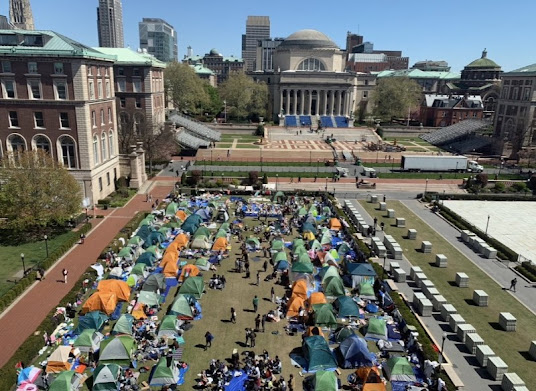The student protests and the Gaza genocide
There are snipers on the roof of the school where I got my MA.
There are police beating students at the school where I got my PhD.
At each school, I studied authoritarian regimes and how they brainwash people into believing that state brutality is not only normal, but deserved.
—Sarah Kenzior, post on X, April 28, 2024
LBJ, LBJ, how many kids have you killed today?
To some of us of a certain age, 2024 is beginning to have a very 1968 feel about it. I turned 18 in 1968. When the Rolling Stones released “Street Fighting Man” that summer, many in my generation saw it as a call to arms.
The annus mirabilis, annus horribilis began with North Vietnam’s Tet Offensive, which turned the tide of the Vietnam War and galvanized a worldwide anti-war movement. On March 17, mounted police charged down protesters outside the US embassy in Grosvenor Square in London, England. On April 4, civil rights leader Martin Luther King was murdered in Memphis, setting off riots in Washington, Baltimore, Chicago, and scores of other American cities. In May, student protests paralyzed Paris and triggered a general strike that brought General De Gaulle’s Fifth Republic to its knees. On June 4, Democratic presidential candidate Robert F. Kennedy was assassinated in Los Angeles. On the night of August 20-21, Soviet-led Warsaw Pact forces invaded Czechoslovakia, peremptorily ending Alexander Dubček’s Prague Spring.
A week later it was the police’s turn to riot at the Democratic national convention in Chicago, where they savagely beat anti-war protestors on Michigan Avenue. On October 2, armed forces opened fire on 10,000 demonstrators in the Plaza de las Tres Culturas in Mexico City, killing hundreds of university and high school students. When the Mexico Olympic Games opened ten days later, Tommie Smith and John Carlos raised their fists in Black Power salutes on the 200-metre medal podium and Czech gymnastics multi-gold medalist Věra Čáslavská turned her head and averted her eyes as the Soviet anthem began to play and the Soviet flag was raised. On October 21, International Anti-War Day, thousands of students occupied Shinjuku Station in Tokyo.
Two weeks later, Richard Nixon, the red-baiting veteran of the House Un-American Activities Committee (HUAC) , was elected US president.
Today’s circumstances are not the same, but the déja vu is inescapable. Then as now, the trigger for disorder has been an unpopular foreign war. Then as now, domestic opposition to involvement in that war has been met with widespread repression. Then as now, the repression has exposed power structures that would sooner hide behind bland facades of neoliberal normality. And then as now, young students have been in the vanguard of the protests.
Gaza is the moment of moral conscience for this generation, as Vietnam was for mine. I’m cheering for the kids. (more...)

No comments:
Post a Comment